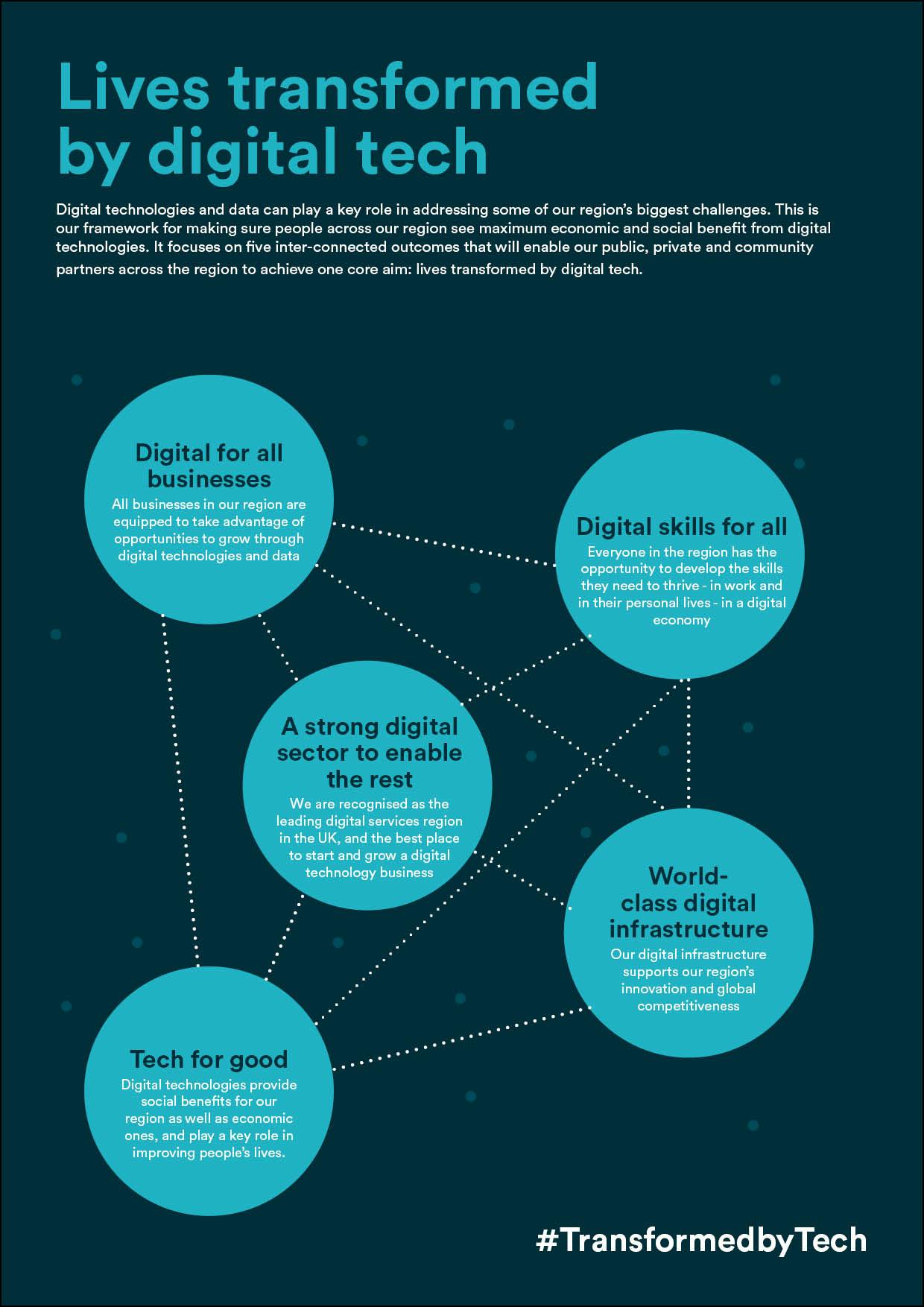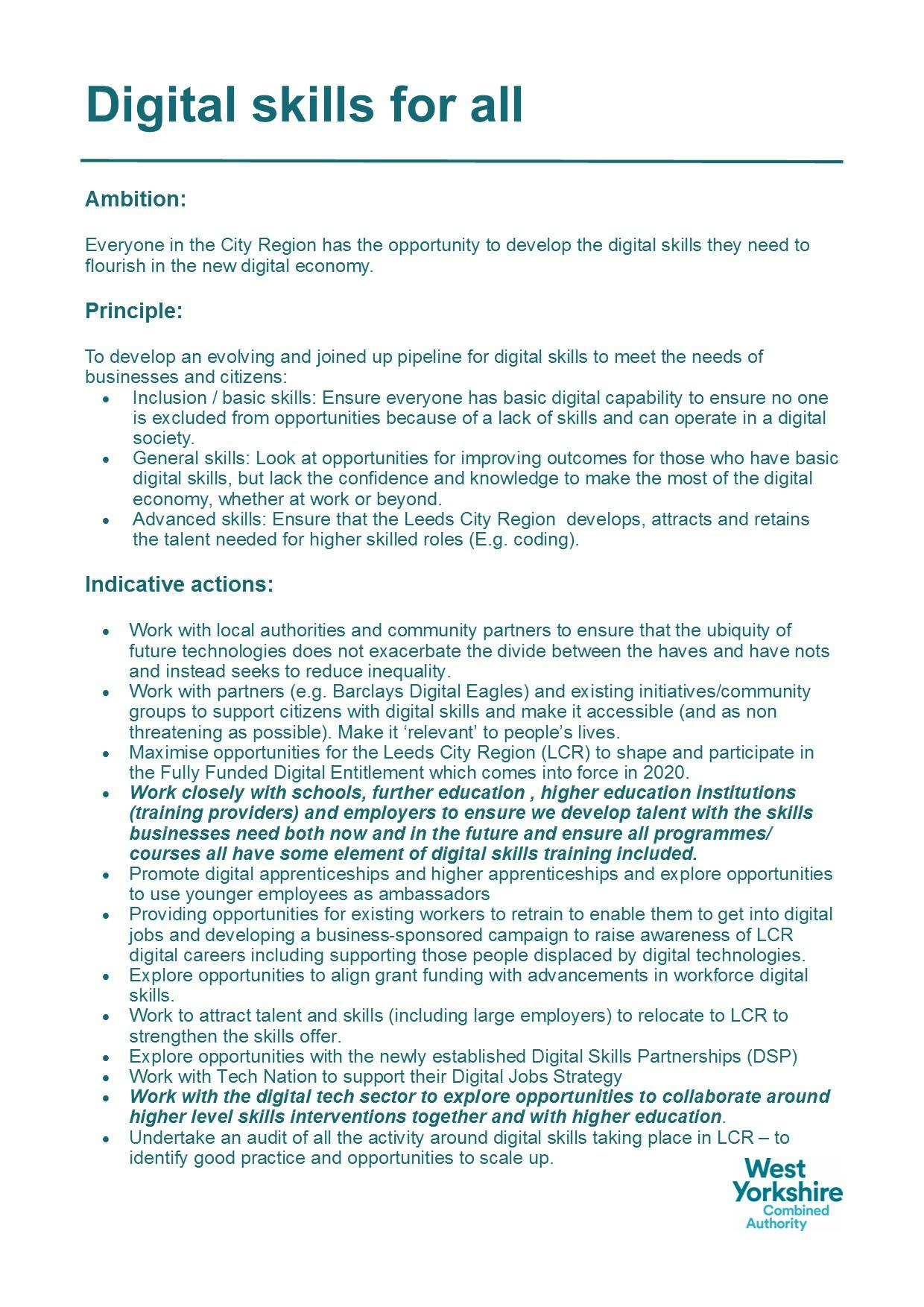How will digital technologies transform your life?
This engagement has now closed, thank you for taking part.
Contributions to this engagement have been used to finalise the Leeds City Region Digital Framework. This was approved at the end of 2018 and can be found here.
Who’d have thought ten years ago that the computer power that put astronauts on the moon could be contained in the smartphone in your pocket?
Digital technologies have shaped our lives in many ways already and the future opportunities are huge.
We’re putting in place a plan to try and make the most of these opportunities for our region and its people.
We’ve done a lot of research and spoken to some of our region’s leading digital innovators to come up with some initial ideas for this plan, which we’re calling “Lives transformed by digital tech”. Click here to view a one page summary of our plan so far.
To develop this plan further, we really want to hear from you.
Contributions to this engagement have been used to finalise the Leeds City Region Digital Framework. This was approved at the end of 2018 and can be found here.
Who’d have thought ten years ago that the computer power that put astronauts on the moon could be contained in the smartphone in your pocket?
Digital technologies have shaped our lives in many ways already and the future opportunities are huge.
We’re putting in place a plan to try and make the most of these opportunities for our region and its people.
We’ve done a lot of research and spoken to some of our region’s leading digital innovators to come up with some initial ideas for this plan, which we’re calling “Lives transformed by digital tech”. Click here to view a one page summary of our plan so far.
To develop this plan further, we really want to hear from you.
This engagement has now closed, thank you for taking part.
-
Digital for all with @nic_greenan from @EastStreetArts
Share Digital for all with @nic_greenan from @EastStreetArts on Facebook Share Digital for all with @nic_greenan from @EastStreetArts on Twitter Share Digital for all with @nic_greenan from @EastStreetArts on Linkedin Email Digital for all with @nic_greenan from @EastStreetArts link
Discussion on Digital for all with @nic_greenan from @EastStreetArts.
-
Why your business needs to embrace digital to survive
Share Why your business needs to embrace digital to survive on Facebook Share Why your business needs to embrace digital to survive on Twitter Share Why your business needs to embrace digital to survive on Linkedin Email Why your business needs to embrace digital to survive link
Yeme Architects, Chief of Everything, Amir Hussain explains how embracing digital has benefited the business and allowed the business to grow from its base in Bradford. Click here to watch his video.
-
Five global challenges that digital can help solve
Share Five global challenges that digital can help solve on Facebook Share Five global challenges that digital can help solve on Twitter Share Five global challenges that digital can help solve on Linkedin Email Five global challenges that digital can help solve link
In this blog we look at five current global challenges which digital technology is helping to solve.
1) Helping Home Care - Konnektis
With a growing elderly population there is an increasing demand for home care support. Konnektis is a digital communications platform that aims to enhance home care through the use of new technology. The business was inspired by co-founder Mark Howell’s Grandad, who as he got older suffered from a range of conditions, including dementia and, like many older people, wanted stay in his own home for as long as possible. It was from here that Konnektis - a collaboration platform for carers that runs on a dedicated, secure 3G internet-enabled tablet that stays in the older person’s home and becomes the hub for real-time information to enable delivery of high quality person-centred care, was created.
Originally trialled in Bradford, the system is now being rolled out to local authorities across the country.
2) Fighting Flooding - Lorawan IoT Network
With the current heat wave gripping the country, flooding feels a distant memory but the impact of heavy rainfall and floods on 26 December 2016 in the City Region highlighted this impact. The Lorawan internet of things (IoT) network is helping communities minimise the consequences of flooding by providing a low power, wide area network of sensors that monitors and collates information on water levels, which can then be used in prevention or as an early warning system of potential floods.
3) Waging War On Waste - Smart Bins
In professional kitchens all over the world there is a crisis with food waste, throwing away up to 20 per cent of the ingredients they buy. Smart bins are tackling this by tracking the waste – the kitchen staff catalogue the bin visit, the weight and the items digitally using a touch screen. This information is then reported back to the head chef. Bill Owen a head chef using the technology told the BBC, “It’s made everyone a lot more conscious and aware of what they’re throwing away. They’re a lot more aware that ‘Oh actually I can use that, I can turn that into this, that trimming I can puree and we’ll make arancini.’” Makers of the bin have reported in some cases you can cut food waste in half
4) Tackling Social Isolation Through Digital - Rock and Roll Farming Podcast
Will Evans has gone from farmer to digital innovator. Over the last 12 months Will started a weekly farming podcast (Rock and Roll Farming), has interviewed the industry’s most prominent figures and built up an archive of more than 60 entertaining and informative chats – including Michael Gove, secretary of state for the environment, food and rural affairs.
His podcast has covered topics such as depression and in his own words is helping to battle isolation in the industry:
“I think social media and digital media give farmers the chance to communicate what we’re doing straight from the farm.”
“It’s been a game changer in terms of reducing social isolation. We’re working more hours, there are less and less people working on farms.
“My grandad says in his day there was always lots of people around but many of us can go days and weeks on end without seeing anyone. Just being able to pick up the phone and connect with like minds is really important.”
5) Making Smart Devices Into Medical Devices - Healthy.io
Everyday millions of people have their urine tested – it’s the world’s second most common diagnostic test. The process is however time consuming and inefficient, enter Healthy.io. The company uses image recognition and artificial intelligence to turn smartphone cameras into clinical grade scanners. Having launched in the UK the company is simplifying the urine analysis pathway for 100,000 Multiple Sclerosis patients.
What global challenges do you think digital technologies can help solve?
Comment with your thoughts below or join in our "digi-talk" discussion forums.
-
Why digital is first and foremost about people - Kersten England
Share Why digital is first and foremost about people - Kersten England on Facebook Share Why digital is first and foremost about people - Kersten England on Twitter Share Why digital is first and foremost about people - Kersten England on Linkedin Email Why digital is first and foremost about people - Kersten England link
Kersten England is Chief Executive of Bradford Council and the lead chief executive for Leeds City Region on digital. She is one of the leading architects of the emerging digital strategy for the City Region, and a passionate advocate for the power of digital technologies to transform lives and revolutionise public services.
In this blog, Kersten sets out why it's essential that our region has a clear strategy to embrace the massive growth of digital technologies here and around the world, and why a developing a truly digital tech region starts with people.
Why we're developing this digital framework
There is little doubt now that the world is going through a technological revolution every bit as significant as the Industrial Revolution that laid the foundations for our region's modern economy.
Just like the Industrial Revolution, this seismic shift has profound consequences for the way our businesses and workplaces operate; the way that people, information, goods and services flow through our towns and cities; and the way we all live our lives.
I recently had the enormous pleasure of meeting Yonatan Adiri, who was the first Chief Technology Officer to former Israeli President Shimon Peres and founder of a healthy.io - a revolutionary product that uses artificial intelligence to transform smartphone cameras into clinical grade scanners. According to Adiri a "tech tsunami" is coming our way. We can either surf the wave, or risk being swept away by the tide.
Although unnerving, the tsunami metaphor underlines just how vital it is that businesses, policymakers and people in the region take digital tech seriously. And that is exactly what we as a City Region partnership are doing through the development of this digital framework. We're determined to surf the wave, and to equip the people and businesses of the region to surf it too.
Why it's especially relevant to our region
It's only right that we in Leeds City Region take a lead on this agenda – after all, we're a place of pioneers and early adopters of technology. Innovation is in our DNA: if we didn't inventit here, we were probably among the first to adopt it.
This is as true today of digital technologies as it was of our manufacturing sector in the 18th and 19th centuries. In the fast-growing fields of data storage, data analytics and cyber security in particular, our region is world-leading.
We're starting from a good place, however we can do more to maximize the impact ofour strengths to truly benefit the people and businesses of the region.
For example, as the youngest city region in the country, we have an immense talent pool of digital natives who have grown up in a world where digital is the norm. Businesses across all industries, not just digital or technology businesses, need their skills if they are to remain resilient in a digital economy. Connecting these individuals with those businesses is a key part of the solution to closing our region's productivity gap, adding £10 billion to our economy and creating thousands of skilled jobs.
The role of public bodies in creating our digital tech future
This is why it's important we have a clear, focused digital strategy for our region. But what's the role of the public sector in helping deliver this strategy?
Fundamentally it's about empowering people to use digital technologies to take control of their own lives – whether by putting in place a reliable, quick and secure digital infrastructure that everyone can access; supporting businesses to adopt digital technologies that will help drive their business forward; or ensuring our education system helps people develop the basic digital skills they need to participate fully in a digital economy.
At a time of shrinking public sector resources, digital technologies have a major role to play in enabling people to continue accessing the services they need. They are also revolutionising the way those services are provided.
This digital approach to service delivery is transforming the relationship between citizens and public bodies, putting the power over services back in people's hands. It is allowing people to design for themselves the services they need. What could be more democratic than that?
Tech for good
The aforementioned healthy.io is a great example of this technology in practice – rather than people having to go to their GP for a urine test and wait a week or more for the results to come back, they can get an analysis within minutes, in the privacy of their own home, using their smartphone.
Such technology isn't just the preserve of international tech entrepreneurs however – it's being introduced right here, right now, by councils across Leeds City Region. In my district of Bradford, the Konnektis platform is putting the individual very much at the centre of their own care by providing a communications hub to connect older people or those in social care with everyone involved in their care network.
Meanwhile the Lorawan internet of things (IoT) network is helping communities minimise the consequences of flooding by providing a low power, wide area network of sensors that monitors and collates information on water levels, which can then be used in prevention or as an early warning system of potential floods. And finally, citizen platforms such as People Can are creating more opportunities for people to get involved in their local communities as volunteers, activists and fundraisers, rebuilding trust and engagement within local areas.
All of these are examples of what we as a City Region are calling "tech for good" - one of the five key outcomes we want to see as a result of our digital strategy, and for me the most important one.
Because this is where our vision for the digital Leeds City Region of the future begins: with our people and businesses. We will know we have been successful in achieving this vision if, in 20 years' time, people have the right digital tools, skills and confidence to take charge of their own destiny, adapt to the inevitable turbulence the world will continue to throw our way, and ride the wave.
What do you think? Do you agree that building a digital tech region for the future begins today with our people and businesses? What digital technologies would help you take more control over your life?
Comment with your thoughts below or join in our "digi-talk" discussion forums.
Quick Poll
Our plans in more detail
Who's listening
Timeline
-
Open
How will digital technologies transform your life? has finished this stageThis engagement is open for contributions.
-
Under Review
How will digital technologies transform your life? has finished this stageContributions to this engagement are closed for evaluation and review. The Project team will report back on key outcomes.
-
Final report
How will digital technologies transform your life? is currently at this stageThe final outcomes of the engagement are documented here. This may include a summary of all contributions collected as well as recommendations for future action.








